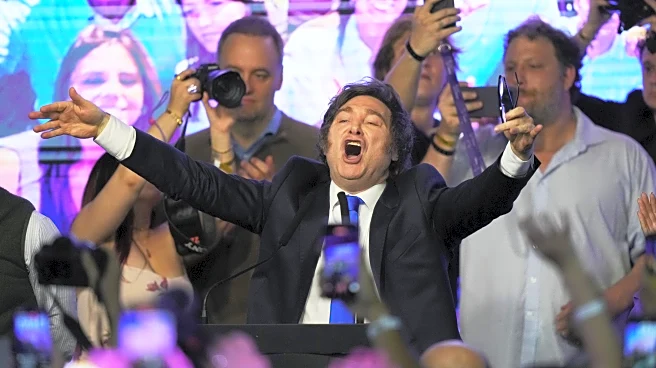BUENOS AIRES, Argentina (AP) — The chief of staff to President Javier Milei of Argentina resigned on Friday, less than a week after the governing party won a new mandate to accelerate his program of radical
reform in pivotal midterm elections.
Guillermo Francos, a 75-year-old career politician with decades of experience at the heart of government, said in a statement that he was stepping down so that Milei “may face without constraints the stage of government that begins after the national elections."
Francos' departure after weeks of speculation was expected to herald a wider Cabinet shake-up, as is common in Argentina following elections. Interior Minister Guillermo Catalán followed suit on Friday.
Riding high off his party’s surprise landslide win in Sunday's legislative elections and $40 billion in pledged funds from a friendly Trump administration, Milei announced that his main spokesperson, Manuel Adorni — an ideological defender of the president’s agenda known for his combative press conferences littered with sarcastic one-liners — would replace the even-tempered Francos as Cabinet chief.
Many far-right supporters of Milei's anti-establishment platform viewed Francos, who hails from Argentina's traditional political elite, with suspicion. But political rivals and lawmakers hostile to Milei's agenda considered him a confidant.
Francos was appointed chief of staff last year as the irascible political outsider sought help from the seasoned negotiator in persuading Congress to pass wide-ranging economic overhaul measures to trim the fiscal budget and spur foreign investment. Before his promotion, Francos served as interior minister, charged with managing Milei's tense relations with provinces opposed to the government's budget cuts.
Milei thanked Francos in a statement for “his service to the nation during these last two years of profound reforms that required continuous dialogue with various political forces.”
He said that, starting on Monday, Adorni would assume the role of chief of staff in response to their party's resounding victory that surpassed pollsters’ expectations, injected energy into faltering reforms and gave their scrappy libertarian party the numbers it needed in Congress to defend presidential vetoes.
“This change responds to the election results, the need to renew political dialogue and the beginning of this second phase,” Milei said.
Although Milei's La Libertad Avanza bloc has boosted its numbers in Congress enough to prevent the left-leaning opposition from passing spending measures that undermine fiscal austerity, the party still lacks a majority.
To see through his free-market overhaul of Argentina’s economy, Milei has acknowledged the need to build alliances with centrist parties and win over influential provincial governors.
Top of the agenda will be liberalizing Argentina's labor market and simplifying its byzantine tax system — big goals that have vexed right-wing governments before. To show his openness to dialogue, Milei welcomed 20 of Argentina's 24 governors to the presidential headquarters on Thursday.
The four governors excluded from the meeting represented Peronism, the populist opposition movement widely blamed for delivering the economic shambles that Milei inherited in the 2023.
In a TV interview with a local channel late Thursday, Mieli defended his decision to leave out the Peronist governors, saying, “It's very hard to have a reasonable dialogue. We can’t sit down with people for whom two plus two doesn’t equal four.”









